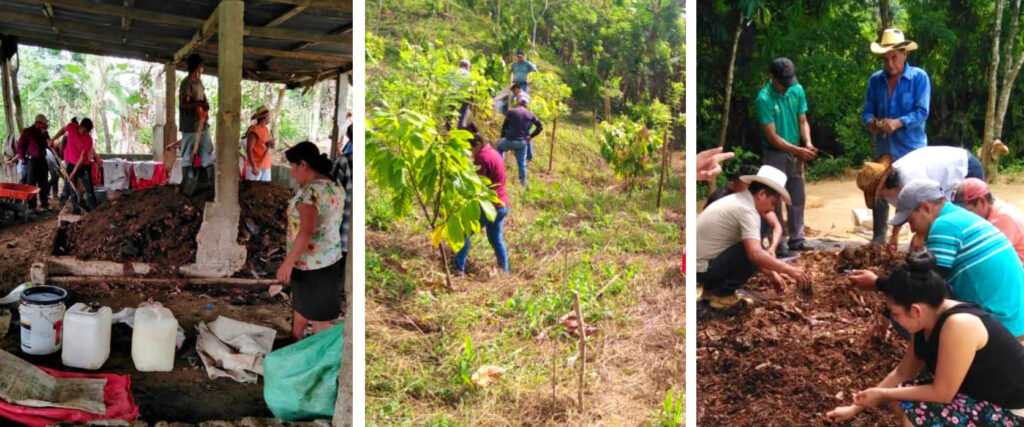The production of organic fertilizers offers new opportunities to cacao producers of COPROASERSO.
A sustainable cacao production under agroforestry systems must be capable of adapting to changing climate conditions, where it is necessary to work permanently to improve soil fertility, better nourish plants and favor life in the soil. These conditions will be possible with the constant analysis and the elaboration and application of organic fertilizers to the plantations. The basis of the fertilizer proposal is based on the identification by the producing families of the visible needs of the plants and the analysis of soils for the preparation and application of organic fertilizers.
Luis Daniel Rodriguez is a member of the Cooperativa de Productores de San Viator Limitada (COPROASERSO), he is originally from Jutiapa, Atlántida, Honduras, a producer with great determination to apply what he has learned and share it with his community and his organization.
The COPROASERSO is part of the National Federation of Cacao Producers Honduras (FENAPROCACAHO), which is supported by the MOCCA project and Lutheran World Relief, leader of the cacao program, achieving the development of workshops in the field to improve skills and cacao plantations of beneficiary families.
The alliance between MOCCA and FENAPROCACAHO in Honduras supports 1,200 cacao producers in the areas of Yoro, Atlántida, Colón and Cortés, providing integration in higher value markets, technical assistance, research, and access to quality genetic material, and promoting models financing catalysts.
“Before I worked the plot in a simple way and did not know how to improve soil fertility and make fertilizers”.
“I learned how to produce compost with products that are within my reach on my farm! Manure, crop residues, cacao husks and banana strains,” he said. “Before, when the leaved of my cacao plants looked yellow I thought it was because they had an illness or were damaged but in the MOCCA training they explained to me that the leaves turned yellow because they lacked nutrients. So, I learned to make compost and other organic products, which has been easy for me because I have all the materials on my farm”, explained Daniel.

The workshops are developed by Joseph Wilson Avila, the star facilitator in COPROASERSO cooperative. Wilson shares with us that the compost is a fertilizer easy to prepare; compost is a fertilizer formed by the decomposition of organic waste.
A 1 cubic meter bin of compost produces 1500 pounds of compost, which is enough to fertilize 500 growing cacao plants or 300 producing cacao plants. It is estimated that fertilization costs represent 40% of the total investments of coffee producers, therefore, being able to make use of the residues represents an important saving for producers who can allocate this money for other activities or family expenses.
Wilson conveys with confidence that he tries to transfer to the producers that a well-nourished plant of cacao grows well, resists pests and diseases, and has the potential to produce a greater quantity of high-quality cacao.
Luis Daniel has started to make 30 hundredweight of compost fertilizer every three months and is applying to his 5.1 acres of cacao under
agroforestry system. Daniel expects to produce 15 to 20 hundredweight per acre as a start and then go on doubling until reaching the maximum production, hoping for more income and better conditions for his family.
“Now we are constantly preparing the compost with my family, it runs out and I prepare again, when I started I really liked it and thought: this black soil will help grow my plants.”
Today my plants have a nice green color (they are healthy) and you can see the change. Certainly I’m doing something “historic”, well, at the least for my cooperative, my farm, and the environment.







